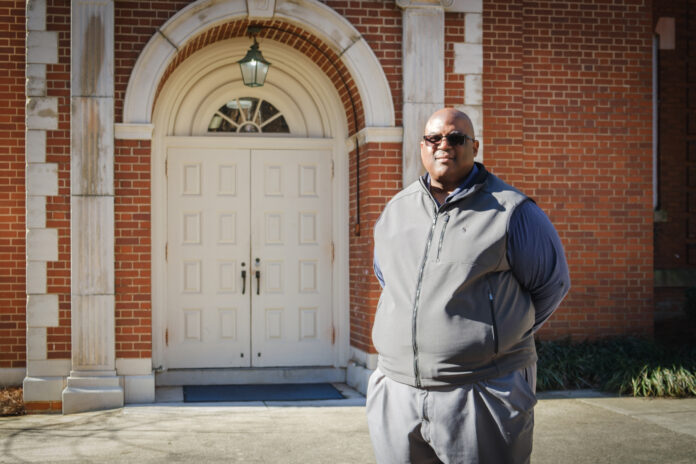
Growing up in Macon, Dr. Keith Howard didn’t think he would become a math professor. But a high school experience at Mercer University helped him see the possibilities for his life.
“We were a military family. I’m the youngest of 10 kids, and I was the first to go to college straight out of high school, so that wasn’t a path that I thought about much,” he said. “I’m very surprised that I’m a professor.”
Dr. Howard joined Mercer’s faculty in 2005, more than a decade after first setting foot on campus as part of the University’s Upward Bound program. Upward Bound is a federally funded program that aims to help low-income students and those whose parents didn’t attend college graduate from high school and pursue higher education.
“It just opened up a new pathway to me, and the other students that were part of the program were kind of likeminded. They were fairly smart, gifted students but needed some direction and exposure,” Dr. Howard said. “Mercer exposed me to not only the college environment but to the professional environment and allowed me to see different possibilities in life.”
The program’s counselors were especially influential, he said.
“They were very engaged in terms of developing your life skills,” he said. “They would find the areas that you needed development and not only encourage you but find ways to put you in those situations and require you to walk through them. It was a combination of encouraging your strengths but also forcing you to deal with your weaknesses and developing those areas of weaknesses so that they can become strengths.”
After graduating high school, Dr. Howard earned his Bachelor of Science in mathematics from Morehouse College and a bachelor’s in chemical engineering from Georgia Tech as part of the institutions’ dual-degree engineering program.
During his undergraduate years, he was awarded the Ronald E. McNair NASA Scholarship, which gave him the opportunity to participate in undergraduate research with faculty members and intern at the Kennedy Space Center. There he discovered his passion for mathematics was greater than his interest in engineering.
“I enjoyed the work, but what I enjoyed more was the research that I was involved in, and the open opportunities and the open questions in mathematics just were more interesting to me,” he said.
Dr. Howard went on to earn his Master of Science and Ph.D. in mathematics from Vanderbilt University. During his final year of graduate study, he was selected as a dissertation fellow at Kenyon College, where he continued working before coming to Mercer.
Today, Dr. Howard serves as vice provost in addition to his role as mathematics professor. As vice provost, he helps develop new graduate studies curriculum and programs. He also liaises between the administrative and academic sides of the University to make sure student services are at their peak.
His research is in the area of mathematical biology, giving particular attention to modeling blood diseases. He also uses his research skills to analyze teaching and learning in the classroom to see how it can be improved.
By now, Dr. Howard has taught “pretty much every class” in the math curriculum. Because of his administrative duties, he teaches a limited schedule, but it remains an important part of his life.
“The thing that I enjoy the most is working directly with students, teaching students. The part where I get to teach classes, to mentor students, to teach UNV, to do research with students — that’s the thing that gets me up in the morning to come to Mercer every day,” Dr. Howard said.
“I think the parts that are probably the most rewarding to me outside of that are the opportunities from time to time to mentor other faculty and to try to make the job more approachable and to help to pass on ensuring that the connectivity with students is growing throughout the University.”
Mentorship is pivotal for everyone, he said, and his philosophy on mentorship goes back to how his counselors mentored him in Upward Bound.
“When I mentor, what I try to do is to identify what role this person could grow into and try to help bloom that. I think you can see the gifts in others and help them develop those gifts, even if they’re not gifts that you yourself have,” he said.
“When I think back to those counselors, none of them were mathematicians. They were not pushing me to be who they were. They were pushing me to figure out who I was and become my best self.”









